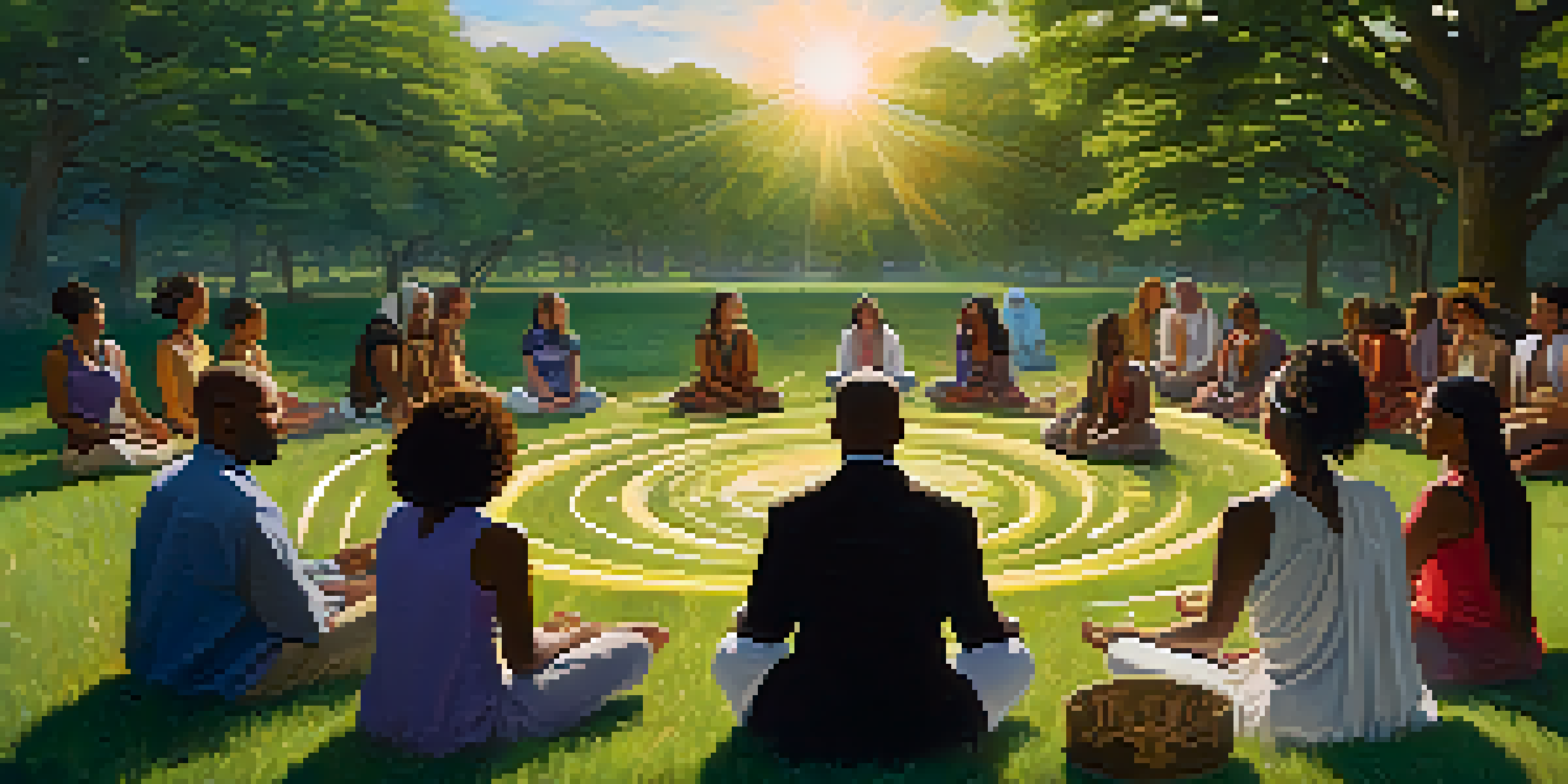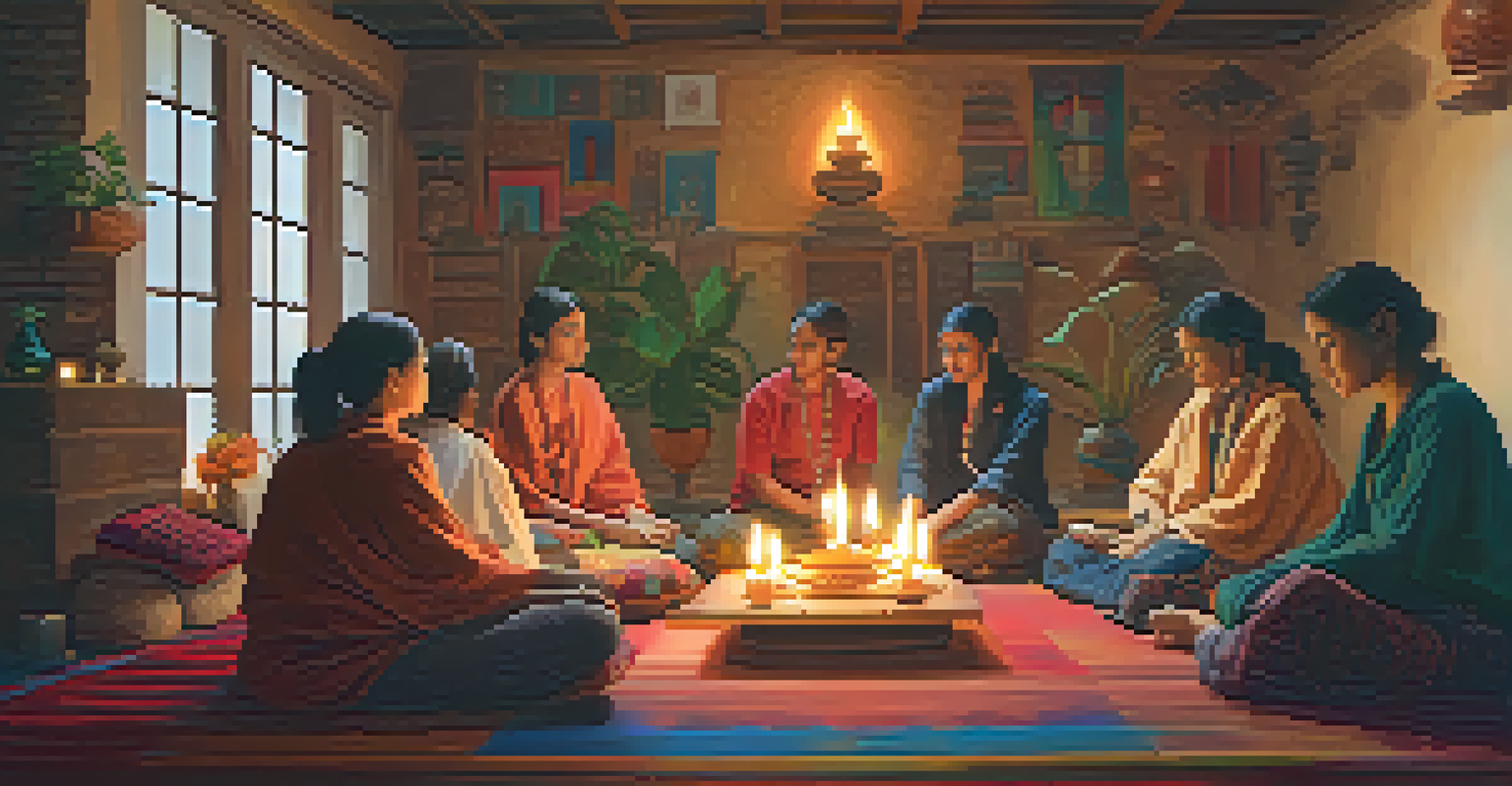The Role of Gender in Defining Spiritual Practices Today

Understanding Gender and Spirituality: A Brief Overview
Gender has long played a significant role in shaping spiritual practices, influencing everything from rituals to beliefs. Traditionally, many spiritual systems have reflected patriarchal values, often sidelining the voices of women and gender minorities. However, as society evolves, so too does our understanding of gender, leading to a more inclusive approach to spirituality that honors diverse identities.
The future belongs to those who believe in the beauty of their dreams.
In recent years, there has been a notable shift towards recognizing how gender intersects with spiritual expression. This shift encourages individuals to explore spirituality beyond the confines of traditional gender roles. Ultimately, acknowledging these dynamics opens the door for richer, more varied spiritual experiences.
Exploring the relationship between gender and spirituality allows us to ask important questions about inclusivity and representation. How can spiritual practices adapt to reflect a broader understanding of gender? By addressing these questions, we can foster a more holistic approach to spirituality that resonates with a wider audience.
Historical Context: Gender Roles in Traditional Spiritual Practices
Historically, many spiritual practices have been dominated by male figures, often relegating women to supporting roles. For instance, in many ancient religions, men were typically the priests or shamans, while women were seen as caretakers or passive participants. This imbalance not only shaped the rituals but also the perceptions of spiritual authority and leadership.

As we look back, we see that the spiritual narratives constructed by men often overlooked the contributions of women and gender-diverse individuals. This historical context is crucial for understanding the contemporary landscape of spirituality, where efforts are being made to rectify these imbalances. Recognizing the past can help us appreciate the progress made and the work that still lies ahead.
Inclusivity in Spiritual Practices
Modern spiritual communities are actively embracing gender inclusivity, allowing individuals to explore their spirituality free from traditional constraints.
Moreover, these traditional gender roles have influenced modern belief systems, leading many to seek out alternative spiritual paths that empower all genders. This desire for inclusivity is a response to the historical exclusion, and it highlights a growing recognition of the value of diverse perspectives in spiritual practices.
Modern Shifts: Gender Inclusivity in Spiritual Communities
Today, many spiritual communities are actively working to embrace gender inclusivity, breaking down the barriers that once defined their practices. This includes creating safe spaces for people of all genders to explore their spirituality without fear of judgment. By doing so, these communities are fostering environments where everyone can thrive and contribute.
In diversity, there is beauty and there is strength.
For example, some spiritual organizations have begun to emphasize the importance of gender-neutral language in their teachings, making their practices more accessible. Additionally, rituals are being reimagined to honor the feminine divine and other gender identities, creating a more balanced representation. This evolution reflects a broader societal shift towards understanding and accepting diverse identities.
As these changes take root, we see a growing sense of belonging among individuals who may have previously felt excluded from spiritual traditions. The collective effort to redefine spiritual practices by including voices from all genders is not only transforming communities but also enriching the spiritual experience for everyone involved.
Intersectionality: The Role of Other Identities in Spirituality
Gender is just one aspect of identity that influences spiritual practices; intersectionality plays a crucial role in shaping individuals' experiences. Factors such as race, sexuality, and class intersect with gender, creating unique challenges and opportunities for spiritual expression. Understanding this complexity is essential for a comprehensive view of modern spirituality.
For instance, a Black woman may experience spirituality differently than a white man due to the interplay of race and gender in society. As such, spiritual practices must consider these intersecting identities to create truly inclusive spaces. This recognition allows for a richer tapestry of beliefs and practices that reflect the diversity of human experience.
Intersectionality's Impact on Spirituality
Understanding how various identities intersect, such as race and class alongside gender, is essential for creating truly inclusive spiritual spaces.
By embracing intersectionality, spiritual communities can foster dialogue and understanding among their members. This approach not only validates different experiences but also promotes empathy and connection, ultimately leading to a more united spiritual landscape.
The Role of Technology: Gender and Online Spiritual Practices
The rise of technology has transformed how spiritual practices are conducted, particularly in the context of gender. Online platforms have made it easier for individuals to connect with spiritual communities that resonate with their identity. This digital shift has opened doors for marginalized voices to be heard and celebrated in ways that were previously impossible.
For example, social media has become a powerful tool for sharing diverse spiritual practices and stories. Many people are now using platforms like Instagram and TikTok to express their spirituality, often focusing on gender identity and inclusivity. This kind of visibility can inspire others to explore their own spiritual paths, fostering a sense of belonging.
However, the digital world is not without its challenges. Online spaces can sometimes perpetuate harmful stereotypes or reinforce traditional gender roles. It's essential for individuals and communities to remain vigilant and intentional about creating safe, inclusive environments that celebrate all aspects of identity in spiritual practices.
Rituals and Symbols: Gender Representation in Spirituality
Rituals and symbols are central to many spiritual practices, and they can reflect underlying gender biases. In some traditions, certain rituals may be exclusively male-focused, while others might celebrate femininity in a limited way. This representation influences how individuals connect with their spirituality and can either empower or alienate them based on their gender identity.
As communities work towards inclusivity, re-examining rituals and symbols becomes crucial. This can involve adapting existing practices to honor all genders or creating new rituals that celebrate diverse identities. For example, incorporating symbols that represent the balance of masculine and feminine energies can foster a more holistic spiritual experience.
Technology's Role in Spirituality
The rise of online platforms has empowered marginalized voices in spirituality, providing new avenues for connection and expression.
By actively promoting gender representation in rituals, spiritual communities can empower individuals to embrace their identities fully. This shift not only enriches the spiritual experience but also cultivates a deeper connection among participants, creating a more vibrant and inclusive spiritual landscape.
Looking Ahead: The Future of Gender in Spiritual Practices
As we move forward, the role of gender in spiritual practices will continue to evolve. The ongoing conversations around inclusivity and representation are vital for shaping the future of spirituality. By remaining open to change and actively engaging with diverse perspectives, communities can create more meaningful spiritual experiences for everyone.
Moreover, the younger generation is increasingly advocating for inclusivity, pushing spiritual traditions to adapt to modern values. This generational shift is driving innovation in practices, encouraging leaders to embrace new ideas and challenge outdated norms. With this momentum, we can expect to see continued progress in how gender is represented in spiritual contexts.

Ultimately, the future of spirituality lies in embracing diversity and honoring the unique experiences of all individuals. By fostering inclusive practices, we can create a spiritual landscape that not only reflects our collective humanity but also celebrates the richness of our differences.